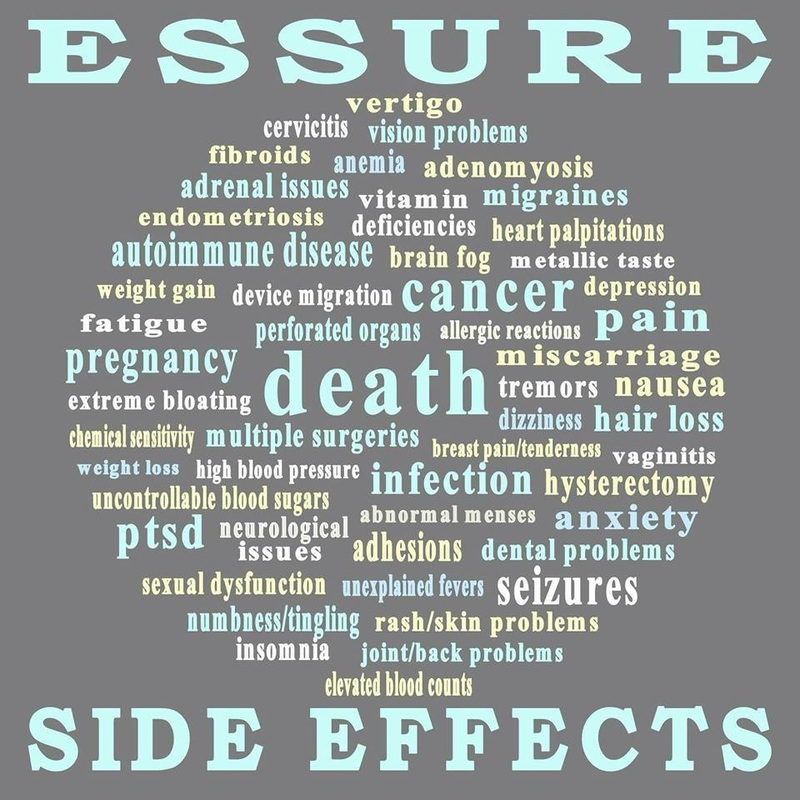On Thursday, September 24th the Food and Drug Administration (FDA) will convene a safety panel that will question the initial research that led to the 2002 FDA approval of Essure. Essure is an implantable metal and polyester coil from Bayer AG designed to provide permanent birth control (sterilization). The FDA panel will also consider whether the benefits of Essure outweigh the risks after hearing public comment. A long running social media campaign of 20,000 strong continues in an attempt to pull Essure off the market while 5,000 official FDA complaints have been filed including allergic reactions, severe chronic pain, and cancer.
Dr. Patricia Carney, medical director/women’s health at Bayer stated, “We, too, are seeing these [adverse] events, but the benefits outweigh the risks.” Bayer officials said the company has been monitoring social-media reports about reactions to Essure and that, in some cases, the company has forwarded those complaints to the FDA. The fact that pharmaceutical companies monitor social media for bad comments about their products should raise an alarm. What methods are they using to monitor social media? Are these monitoring methods legal? Why hasn’t that information gathered by Bayer been made public?
Diana Zuckerman, who heads the National Center for Health Research, a Washington-based watchdog group that has been studying Essure says that Bayer didn't fully inform the FDA about the problems the device can cause when it got the device approved in 2002.
What the public is seeing unfold with the Essure controversy are shortcomings at many levels of a medical system deeply intertwined with a “profits-over-people” pharmaceutical company (Bayer.) First, there is the common event of inadequate studies of a drug company product and in some cases, purposeful concealment of data. Next, regulatory agencies such as the FDA, CDC, and others are continually being shown to be asleep at the wheel. From here, blame falls on the doctors for not giving proper informed consent to the patients. Finally, instead of admitting there is an issue with their product, pharmaceutical companies instead choose to silently monitor social media for bad PR. Since doctors and drug companies are refusing to take responsibility for the damage incurred to patients by Essure, confused and damaged people are left with no recourse but to ask for help via social media.
It has been show through the work or investigative reporter Sharyl Attkisson that drug companies hire firms that specialize in astroturfing those raising question and alerting the public via social media and new outlets. Astroturf agencies seek to manipulate you into changing your opinion by making it seem as if you’re an outlier–when you’re not. The hallmarks of astroturf and propaganda include use of inflammatory language such as quack, crank, nutty, pseudo, paranoid and conspiracy.
We can’t expect drug companies to act with an individual’s health as their number one priority when they are a for-profit company. In fact, a little research will show a history littered with abuse of the public trust, informed consent and countless lawsuits paid out for untold damage to patients and consumers. It is up to those who have been affected or damaged to continue to speak out and educate everyone they know. Start blogs, reach out to the alternative media and tell your story, warn others any way you can. Meanwhile, it each of our responsibilities to demand proper information and full informed consent from our medical community and healers. Medical ethics and “do no harm” is currently on a slippery slope having lost footing on concepts like “the greater good” and a “profits-over-people” paradigm directed by drug companies and insurance companies.
Dr. Patricia Carney, medical director/women’s health at Bayer stated, “We, too, are seeing these [adverse] events, but the benefits outweigh the risks.” Bayer officials said the company has been monitoring social-media reports about reactions to Essure and that, in some cases, the company has forwarded those complaints to the FDA. The fact that pharmaceutical companies monitor social media for bad comments about their products should raise an alarm. What methods are they using to monitor social media? Are these monitoring methods legal? Why hasn’t that information gathered by Bayer been made public?
Diana Zuckerman, who heads the National Center for Health Research, a Washington-based watchdog group that has been studying Essure says that Bayer didn't fully inform the FDA about the problems the device can cause when it got the device approved in 2002.
What the public is seeing unfold with the Essure controversy are shortcomings at many levels of a medical system deeply intertwined with a “profits-over-people” pharmaceutical company (Bayer.) First, there is the common event of inadequate studies of a drug company product and in some cases, purposeful concealment of data. Next, regulatory agencies such as the FDA, CDC, and others are continually being shown to be asleep at the wheel. From here, blame falls on the doctors for not giving proper informed consent to the patients. Finally, instead of admitting there is an issue with their product, pharmaceutical companies instead choose to silently monitor social media for bad PR. Since doctors and drug companies are refusing to take responsibility for the damage incurred to patients by Essure, confused and damaged people are left with no recourse but to ask for help via social media.
It has been show through the work or investigative reporter Sharyl Attkisson that drug companies hire firms that specialize in astroturfing those raising question and alerting the public via social media and new outlets. Astroturf agencies seek to manipulate you into changing your opinion by making it seem as if you’re an outlier–when you’re not. The hallmarks of astroturf and propaganda include use of inflammatory language such as quack, crank, nutty, pseudo, paranoid and conspiracy.
We can’t expect drug companies to act with an individual’s health as their number one priority when they are a for-profit company. In fact, a little research will show a history littered with abuse of the public trust, informed consent and countless lawsuits paid out for untold damage to patients and consumers. It is up to those who have been affected or damaged to continue to speak out and educate everyone they know. Start blogs, reach out to the alternative media and tell your story, warn others any way you can. Meanwhile, it each of our responsibilities to demand proper information and full informed consent from our medical community and healers. Medical ethics and “do no harm” is currently on a slippery slope having lost footing on concepts like “the greater good” and a “profits-over-people” paradigm directed by drug companies and insurance companies.







 RSS Feed
RSS Feed